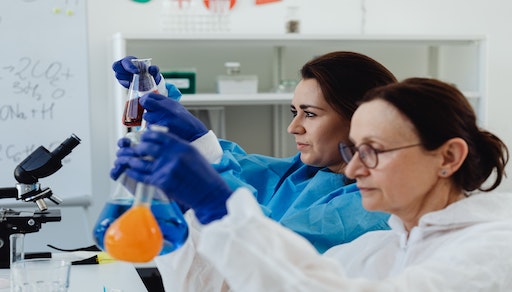Laboratory glassware is common in any lab environment but is markedly different from kitchen glassware. Due to its purpose and delicate nature, it must be used exclusively for laboratory applications and only handled with the appropriate equipment. Furthermore, it’s important to remember the temperatures that lab beakers and other components can reach during an experiment.
Below we explain the safety hazards of having glassware in the lab without proper equipment, provide tips to ensure safety when handling lab glassware, and then explore the available types of handling equipment.
Laboratory glassware hazards
Without the proper lab equipment and handling techniques in place, when working in a laboratory, there are several glassware hazards to be aware of, including:
- Burns or injury: Handling glassware in a lab that has been heated due to chemicals or reactions during experiments can cause burns. If the temperature exceeds safe limits, individuals in the lab environment need to wear protective gloves (link) or use appropriate handling equipment like tongs, as this can help prevent burns. Also, when handling acidic or highly reactive chemicals, it is essential to adequately protect yourself to eliminate the risk of irritation and more severe injury.
- Damage to equipment: Mis-handling of lab glassware and equipment can cause damage to nearby working stations and other equipment through spillage, leaking air, knocks or vibrations. If pieces are not properly sealed or fitted together, it can lead to breaks or cracks, which in turn could cause further damage to the environment. Safe practices such as wearing safety goggles and properly locking down pieces of equipment must be followed when working with glassware and lab equipment.
10 Tips for the safe handling of laboratory glassware
- Ensure proper safety protocols are followed and use the right protective gear such as gloves, goggles and lab coats.
- When lifting or transporting glassware, always use both hands and secure the item firmly before moving it.
- When cleaning laboratory glassware, take extra care to avoid breakage by using soft sponges or cloths with mild soap and water solutions.
- Store laboratory glassware in appropriate storage containers to keep items secure during transport or storage whenever possible.
- When working with large pieces of glassware, such as beakers or flasks, use tongs or tweezers to move them instead of your hands unless necessary.
- Always inspect laboratory glassware for cracks or damage before use, and discard any items that appear compromised.
- Never attempt to repair broken pieces of lab equipment or glassware – dispose of any damaged items immediately following safety protocols.
- Use a lint-free paper towel when wiping off excess liquid from the outside of the container – this helps reduce the chances of spills and breakages due to slippery surfaces.
- When cleaning multiple pieces at once, wash them one at a time using gentle motions rather than trying to do multiple in one go – this reduces the risk of accidental breakage.
- Finally, never leave laboratory glassware near open flame sources, which can lead to explosions or more severe accidents!
Types of glassware handling equipment
Safety equipment such as tongs, gloves, and other protective gear is essential when handling glassware in a lab. These can help reduce the chances of burns, spills or breakages. At Techmate, we provide a wide range of laboratory-grade safety equipment and accessories designed specifically to protect individuals in the lab environment. This includes items such as tongs and heat-resistant gloves that are suitable for heated materials use. Other pieces include forceps for holding small glass items, tweezers for precise handling of objects, rubber stoppers for sealing containers and various specialised gloves for different tasks. Using these items alongside standard safety practices can ensure a safe lab environment regardless of the experiments conducted.
In conclusion, the safe handling of laboratory glassware is essential to ensure the safe operation of experiments in any lab environment. With the right glassware handling equipment provided by Techmate, labs can fully protect their personnel and ensure that they take all necessary precautions when conducting experiments with laboratory glassware. Proper use of protective items such as gloves, goggles and lab coats, along with the correct lifting and transporting devices, will significantly reduce the chances of accidents or spills from occurring.
Get in touch with the team at Techmate, if you help to understand your laboratory’s needs.

